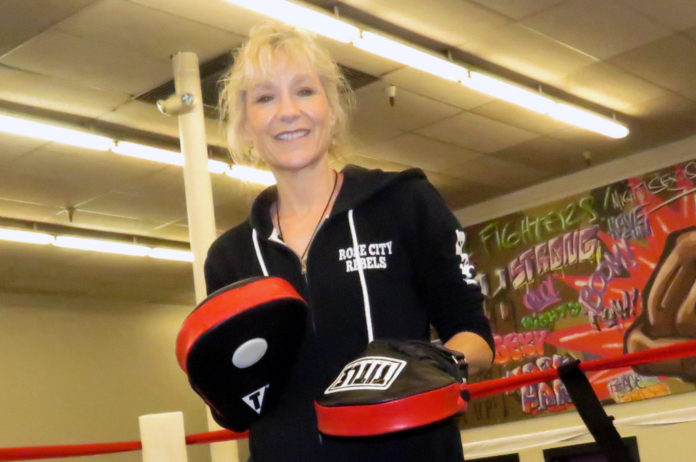
Stop by Kimberly Berg’s new Rebel Fit Club in downtown Tigard during a circuit training class, and you will hear great classic rock music coming out of the loudspeakers. More importantly, you will see dozens of participants, most wearing Rebel T-shirts, spinning hula hoops, jumping rope, using punching bags, walking on treadmills, lifting weights, riding stationary bicycles and swinging battle ropes.
The centerpiece of the gym is a boxing ring with red, white and blue ropes, where Berg leads participants through a series of punches that she deflects, while around the room volunteers cheer on the athletes and help them do the exercises correctly.
And by the way, every athlete in the room has Parkinson’s disease, but when they leave after the hour class, they are smiling and have a bounce in their step.
What did Parkinson’s patients do before this exercise option was available? “Deteriorate,” Berg said. “Historically, people who were diagnosed were told to go home, but research has shown that exercise changes the brain. There is nothing wrong with their legs and arms. The issue is the signals from the brain. And we teach life skills, like how to turn around without tripping over your feet.”
The Rebel Fit Club offers many levels of classes: The stage one/two classes are for newly diagnosed, and/or where people are still functioning well. There are one or two coaches plus a number of volunteers making the ratio one for about every six fighters who can number up to 30.
The classes for levels three and four fighters only have 11 or 12 in a class who bring a spouse or “corner-man,” and there is a lower ratio of volunteers to fighters. Although they warm-up in a chair, “we get them out of chairs, and we push them,” Berg said.
She added, “By the time people are diagnosed, 60 to 80 percent of their dopamine is gone, but not everyone has tremors. We work on strategies to overcome the symptoms. Not only do people benefit from these classes but they make friends and feel better, and their wives become friends. Parkinson’s is a lonely existence, so imagine coming to a place where people understand you. Our fighters form their own support group, and we have random outbreaks of dancing, which is never a bad thing.”
According to Berg, Parkinson’s is called the snowflake disease because it affects every person differently.
Berg started holding exercise classes for people with Parkinson’s in Tigard five years ago on 74th Avenue and has since added four more locations, plus replacing the 74th Avenue location with the one on Main Street. There are 300 participants spread across the five locations along with seven coaches, who all have degrees in sports medicine or exercise physiology, but considering there are thousands of people with Parkinson’s in the metro area, only a small percentage is benefiting from this exercise program.
“We would like to fill up our facilities with classes all day long,” Berg said. “Right now we have 35 classes Monday through Saturday throughout our locations along with tai chi, yoga, dancing, drumming and voice training. And we would like to add classes for people with other neurological diseases. These would not be blended classes because each condition is different.”
In addition to all the exercises specifically designed for people with Parkinson’s, there is the boxing component.
“Boxing is not as big in Oregon as some other states, and there are not a lot of boxing gyms left,” Berg said. “I did find two places with boxing rings, but my wish list is long. I can’t just set up a program in a church basement.”
In addition to the boxing and exercise programs, Berg also started the Portland Rebel Performance Project in 2012 for people with Parkinson’s that includes dance, drumming and singing, and the group performs around the area.
“Tigard has embraced us,” Berg said of her newest gym. “People are so friendly, and they were so helpful when we were getting ready to open.”
Rebel Fit Club offers monthly memberships with the cost dependent on how many classes participants take each week. “Everything is low-cost, below industry standards, and we offer scholarships,” Berg said. “Rose City Rebels is our fight club name, and the Rebel Fit Club is the name of our headquarters club. The other sites I have are in rented space in other people’s gyms. I can’t call them Rebel Fit Clubs, but they are part of my Rock Steady Boxing program with the headquarters called the Rebel Fit Club. One of my dancers said, ‘We’re kind of rebels,’ and the name stuck.”
Berg holds a bachelor’s degree in athletic training and sports medicine and a master’s degree in clinical exercise physiology. For more than 25 years, she has trained people with a wide range of needs, specializing in Parkinson’s, cardiovascular disease and orthopedic rehabilitation, and holds certifications in several areas.
Her determination to include boxing in her programs is due to her family history. Her uncle was a fighter, and her mother (his sister) sparred with him and started sparring with Berg. “Most people’s sparring partner is not their mother,” she noted.
Berg does a weekly blog in which she offers nutritional tips and exercise ideas, and she includes stories about her Parkinson’s fighters’ success stories tackling things they previously thought they could not do.
“I always include joy, and if I talk about a problem, I write about a solution,” she said. “The website is designed for joy.”
Tigard’s Kimberly Berg’s Rebel Fit Club is located at 12084 S.W. Main St., next to Rite Aid; the phone number is 503-407-1335; the website is rebelfitclub.com.





















